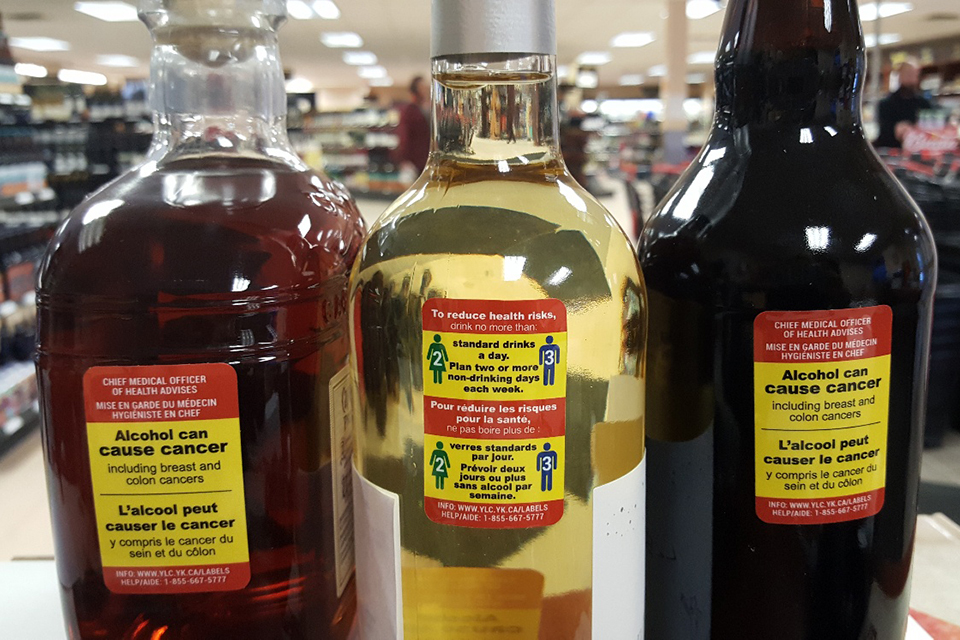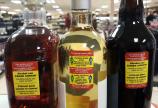Alcohol warning labels about cancer risk a Canadian first

Starting today, warning labels cautioning consumers about the link between alcohol use and an increased risk of breast and colon cancer will be applied to all bottles and cans sold at the Whitehorse liquor store. This specific labelling, part of the Northern Territories Alcohol study led by the University of Victoria’s Canadian Institute for Substance Use Research (CISUR, formerly CARBC) and Public Health Ontario (PHO), is a first for Canada.
“We commend the Yukon Liquor Corporation for having the courage to be the first jurisdiction in Canada to provide more detailed labels for its residents,” says CISUR director Tim Stockwell, one of the project’s co-investigators.
Researchers say that findings from this study will provide results that government and other public health practitioners can use to inform current and future alcohol harm reduction strategies in communities in Yukon as well as in other jurisdictions in Canada.
The comprehensive labels give details of Canada’s low-risk drinking guidelines as well as cancer risks.Yukon has the highest sales of alcohol per capita and has one of the highest cancer rates in Canada, according to Statistics Canada and a recent report from Yukon Health and Social Services.
For the first phase of the study, CISUR and PHO researchers spent more than two years travelling to the territory to conduct focus groups with consumers and stakeholders. Their findings so far, published in two papers in the journal Alcohol and Alcoholism, found strong support for enhanced alcohol labels displaying standard drink information, national drinking guidelines, health messaging and a pregnancy warning. They also found that consumers were more likely to correctly estimate how much they were drinking when presented with labels containing standard drink and low-risk drinking guideline information.
The Government of Yukon has a long-standing policy requiring the Yukon Liquor Corporation to affix warning labels about the risks of alcohol use during pregnancy to all its products sold at stores since 1991. It’s one of only two Canadian jurisdictions to use any kind of alcohol warning labels.
“Our research told us that consumers would be accepting of these new enhanced labels,” says Kate Vallance, research associate at CISUR and lead author on one of the papers. “For this second phase of the study, we will apply these findings in a real-world setting instead of in a focus group, which means more awareness of the health risks of drinking and the low-risk drinking guidelines, as well as a reduction in harmful drinking.”
“This study is the result of a long-term collaboration between research, policy, and practice stakeholders from across Canada and internationally, as well as with local champions in Yukon, including the Office of the Yukon Chief Medical Officer of Health and the Yukon Liquor Corporation,” says Erin Hobin, a PHO scientist and lead investigator on the study.
Funding for this project was provided by Health Canada, Canadian Centre on Substance Use and Addiction, and Public Health Ontario.
Vallance and Stockwell are authors on two papers on drink labelling in Alcohol and Alcoholism:
- Testing the Efficacy of Alcohol Labels with Standard Drink Information and National Drinking Guidelines on Consumers’ Ability to Estimate Alcohol Consumption
- “We Have a Right to Know”: Exploring Consumer Opinions on Content, Design and Acceptability of Enhanced Alcohol Labels
Stockwell is an author of a meta-analysis of studies examining the relationship between alcohol use and breast cancer in Alcoholism: Clinical and Experimental Research.
A media kit containing photos is available on Dropbox.
Listen to the audio feed from the Nov. 22 press conference in Whitehorse led by the Yukon Liquor Corporation and the Yukon Government below:
-- 30 --
Photos
Media contacts
Tim Stockwell (Director, Canadian Institute for Substance Use Research, University of Victoria) at 250-415-5445 or timstock@uvic.ca
Kate Vallance (Research Associate, Canadian Institute for Substance Use Research, University of Victoria) at 250-472-5934 or vallance@uvic.ca
Erin Hobin (Scientist, Public Health Ontario) at erin.hobin@oahpp.ca
Suzanne Ahearne (University Communications + Marketing) at 250-721-6139 or sahearne@uvic.ca

